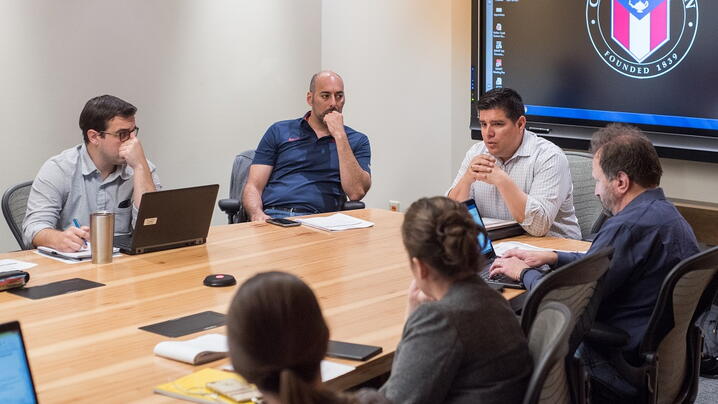
All of our worlds have been ‘a changin’ and none more directly impacted than that of local governments. COVID-19 has begun a new mindset unheard of nor encountered in a lifetime for most and with apologies to SARS, not since the Spanish flu of 1918. Both that pandemic and the current one sent ripples of fear throughout the world and caused a significant number of deaths and serious illnesses. Due to our plentiful if not always synchronized media accounts, this pandemic will be the most discussed and publicized even if not the deadliest.
Troubled times faced without a clear roadmap are a puzzle for even the hardiest of souls and full of anxiety for the rest of society. Curling up by the hearth/fire was not portrayed as a pleasant pastime; it became the only one for many people. Going to the local recreation center was off-limits in part because most if not all were closed for several months; carrying on as an active member of a team sport was a non-starter and of considerable frustration for parents and hopeful football, baseball, and hockey stars alike. In some communities, even the grass had a forced vacation as summer students were no longer employed to cut the parks grass for the season as employment was not offered and the lawnmowers never made it past the garage door. The growth of the grass continued unabated and untended.
What did not change was the need to deal with elections even though how these were scheduled and orchestrated was not in an election official’s playbook nor a candidate’s knowledge base. In some instances, and where permitted by the law, elections were postponed or at least conducted under quite different parameters.
With considerable scrambling, municipal officials were challenged by the task of running effective elections that had to be viewed as above reproach in terms of whether or not these were fair and balanced; and then faced with the need to establish some mechanism for ensuring that new councils were appropriately oriented to what for many would be their first foray into the obscure world of local government. Reliance on virtual presentations became the order of the day and the struggles of making that adjustment for many would be a task not witnessed in any previous municipal setting. Quite simply, there was no playbook and, one could argue, the pandemic also took away the field.
What remains and will persist is the need for good governance by all elected officials.
Local officials are generally the first body to be impacted by these new conditions and like in many other ways, other types or levels of government will be closely watching as for many, their time is coming. The only way to approach these new conditions is two-fold: 1) concentrate on getting across messages “as if” the process and approach was unaffected by a pandemic; and 2) examine alternatives which ensure that “our” elected officials have the greatest opportunity of being a success.
What does a new mayor or councilmember need to know?
Without presuming to cover all the “before pandemic” topics, such learning would need to cover: our legal basis and purpose; the key roles and powers of a mayor; the obligations and roles of a councilmember; term of office; swearing in of the council; an overview of “governance” in the local context; the mandate, powers, and expectations of the city manager (otherwise known as chief administrative officer); the expected relationship between elected officials and management; access to management (what is permitted and what is deemed to be off-limits); a description of the organization structure and the key functions being delivered; where to forward questions and complaints; how to establish a budget and set the tax rate; what grants are available; how fees and charges are determined and applied; what constitutes a conflict of interest or bias; how many meetings are scheduled and for what purpose; who chairs and what powers and obligations does that entail; what do we get paid?
I have written and lectured on virtually all of the foregoing topics in person and through a virtual-based media. What has not changed is the need to get these messages across in a forthright, understandable, and comprehensive manner. Councilmembers are there for the challenge of serving their community. Few if any would allow a pandemic, fire, flood or other disaster to dissuade them of the critical importance of public service. We owe to all a considerable degree of gratitude.
COVID world or not, below are several great resources on the topic of council-manager relations that local government managers should read to ensure future success:
- Four Fatal Flaws of a Council-Manager Relationship.
- Why Orientation is Needed for All Members in Local Government.
- Making It Work: The Essentials of Council-Manager Relations.
- Ask an ICMA Manager: Three Key Elements of Council-Manager Relations.
George B Cuff, FCMC, is president of George B Cuff & Associates Ltd., based outside of Edmonton, Alberta. His firm has offered seminars on governance and good management for the past 40 years and has conducted over 500 reviews of municipalities, government departments, agencies, and not-for-profits. His background can be found on www.georgecuff.com. He has taught in the ICMA University program over the past 10 years on the topic of “Fatal Flaws of a Council-Manager Relationship.” George has a background both as a municipal manager and as a mayor elected four times serving 12 years in that capacity.
New, Reduced Membership Dues
A new, reduced dues rate is available for CAOs/ACAOs, along with additional discounts for those in smaller communities, has been implemented. Learn more and be sure to join or renew today!
